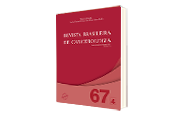Perception of the Adolescent in face of its Condition of Oncological Sickening
DOI:
https://doi.org/10.32635/2176-9745.RBC.2021v67n4.1672Keywords:
Adolescent, Neoplasms, Oncology Nursing, Qualitative Research, Health of Institutionalized AdolescentsAbstract
Introduction: Cancer illness brings a tiresome routine due to aggressive therapies, and changes occur in the adolescent’s life. Objective: Understand the perception of the adolescent in face of its condition of oncological sickening. Method: Exploratory, descriptive, and qualitative research, through the Collective Subject Discourse technique, conducted with 13 adolescents, from June to August 2019, at the Specialized Center for Pediatric Oncology of a university hospital. The individual interviews were recorded based on the following questions: What is it like to be sick to you? What do you think about your future? How do you relate to your family members and the health team? Results: Eight central ideas were identified, among them: being sick is bad because it limits normal life routines; the treatment is painful and changes my body image; being sick has a good side; be healed and resume plans for my life; the hospital and the team are welcoming; proper welcome and empathy are lacking; humanized care; family support. Conclusion: In the adolescent’s perception, illness goes beyond the physical health condition, interferes, and limits theirs and their family quality of life, and therapeutic listening is essential for humanized care.
Downloads
Downloads
Published
How to Cite
Issue
Section
License
Os direitos morais e intelectuais dos artigos pertencem aos respectivos autores, que concedem à RBC o direito de publicação.

This work is licensed under a Creative Commons Attribution 4.0 International License.









